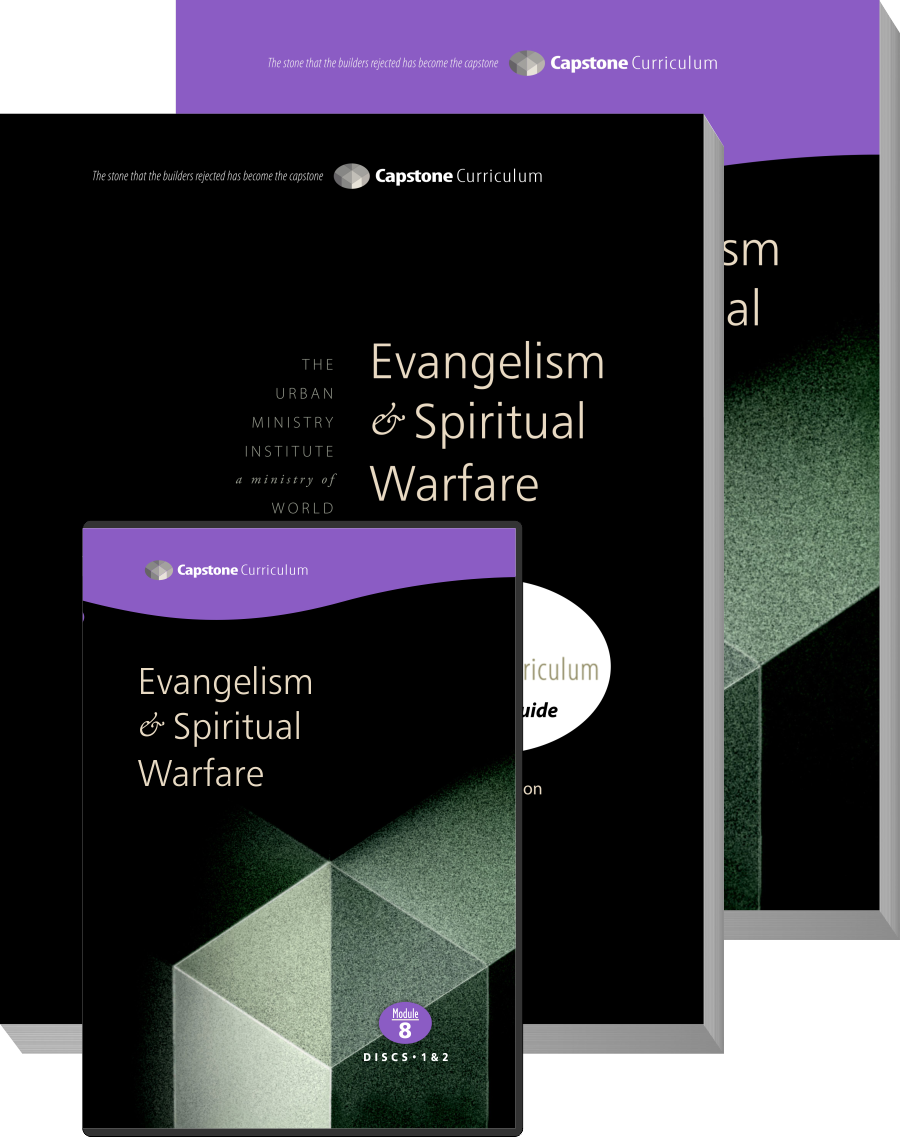 Module 8: Evangelism and Spiritual Warfare
Module 8: Evangelism and Spiritual Warfare
Evangelism is proclaiming and demonstrating to the world that God has visited the world in the person of Jesus of Nazareth, and that this visitation is now accompanied by liberation from the devil and from the effects of sin! To evangelize is to prophesy deliverance in Messiah Jesus.
This module covers in a broad outline the key dimensions of evangelism and spiritual warfare, including the Bible’s telling of the war of the universe that was caused by the disobedience of the devil and humankind. God's good creation was made subject to demonic powers and death, and humankind is now enslaved by selfishness, disease, alienation, and death. Through the life, death, and resurrection of Jesus Christ, believers are delivered from Satan's dominion, as well as from the effects of the Curse through the power of the Spirit. In this module we discuss how to prepare for effective urban evangelism through intercessory prayer, personal soul winning and public preaching, and introduce the concept of the household network, or oikos in urban evangelism. We close our discussion by stressing the need to conserve the fruit of our evangelism by following up new converts, that act of "incorporating new converts into the family of God so they can be equipped to grow in Christ and use their gifts for ministry."
Course Details
Lesson 1: Spiritual Warfare
Lesson 2: Evangelism: Content
Lesson 3: Evangelism: Methods
Lesson 4: Follow-up and Incorporation
Format
Mentor Guide: 215 page book
Student Workbook: 160 page book
DVD Set: approximately four hours of video
Title Page | Instructor | Copyright
Module Description
Evangelism and Spiritual Warfare
Evangelism is proclaiming and demonstrating to the world that God has visited the world in the person of Jesus of Nazareth, and that this visitation is now accompanied by liberation from the devil and from the effects of sin! To evangelize is to prophesy deliverance in Messiah Jesus.
The lessons of this module are organized to provide you with a solid overview of the critical issues arising from a biblical grasp of evangelism and spiritual warfare. The first lesson, Spiritual Warfare: Binding of the Strong Man, outlines the war of the universe that was caused by the disobedience of the devil and humankind. God’s good creation was made subject to demonic powers and death, and humankind is now enslaved by selfishness, disease, alienation, and death. Through the life, death, and resurrection of Jesus Christ, believers are delivered from Satan’s dominion, as well as from the effects of the Curse through the power of the Spirit. Evangelism is proclaiming God’s deliverance through Jesus Christ to the entire world in the power of the Holy Spirit.
Lesson two deals with Evangelism: The Content of the Good News of the Kingdom. Evangelism proclaims and demonstrates God’s deliverance in Christ through word as well as love and service to others. This ministry focuses on Christ; evangelism is nothing less than communicating the person and work of Jesus Christ! The Nicene Creed offers a clear useful, and powerful outline of the critical truths associated with Jesus’ incarnation, passion, resurrection, ascension, and Second Coming. If we master these truths, we can clearly communicate them in our urban neighborhoods.
Our next lesson, Evangelism: Methods to Reach the Urban Community, reveals how evangelism is not only what we say but who we are and what we do. To speak persuasively of the Lord Jesus in our communities, our credibility must be rooted in solid character and genuine spirituality. We will look at communication methods by which to share the Good News, and the importance of preparation for effective urban evangelism through intercessory prayer. We will look at personal soul winning and sharing one’s testimony, along with the importance of evangelism through public preaching and discourse. We will also consider the concept of the household network, or oikos in urban evangelism.
Finally in lesson four, Follow-up and Incorporation, we will explore the idea of conserving the fruit of our evangelism by following up new converts, that act of “incorporating new converts into the family of God so they can be equipped to grow in Christ and use their gifts for ministry.” We will look at how the apostles nurtured new converts, and study how we can use the same steps to bring new converts into a local assembly of believers, on the road to spiritual maturity and fruitfulness.
Our Lord Jesus desires that we bear much fruit to the glory and praise of God (John 15.8-16). May the Lord bless your study of his Word so you can join the harvest workers in gathering the fruit of the Lord’s own salvation, to the Father’s glory!
Required Textbooks
The Capstone Curriculum
Capstone Curriculum is a 16-module training program, taught at a seminary level, which we specifically designed to serve as the most essential knowledge and skill learning necessary for effective urban ministry. Each module (course) comes with a Mentor’s Guide, a Student Workbook and two DVD’s (four hours of video).
![]() Each module also has required textbooks, and this graphic is linked to the reading assignments associated with those textbooks for that specific module.
Each module also has required textbooks, and this graphic is linked to the reading assignments associated with those textbooks for that specific module.
![]() Some modules have Suggested Readings that would enhance student learning. While these are not required assignments, they are included for further study if your students are interested.
Some modules have Suggested Readings that would enhance student learning. While these are not required assignments, they are included for further study if your students are interested.
![]() All of our Capstone Student Workbooks (English and Spanish) are available on Kindle and is a handy complement to your Capstone Students Softcover Workbook; the accessibility of the digital editions will be a lifetime resource for sermon preparation, Bible Study, and theological research. We are also seeking to make all of our required textbooks available on Kindle. If a book is available on Kindle, it will be linked to this icon in the book's description.
All of our Capstone Student Workbooks (English and Spanish) are available on Kindle and is a handy complement to your Capstone Students Softcover Workbook; the accessibility of the digital editions will be a lifetime resource for sermon preparation, Bible Study, and theological research. We are also seeking to make all of our required textbooks available on Kindle. If a book is available on Kindle, it will be linked to this icon in the book's description.
![]() A few textbooks are also available as audio books. The books that are will have this linked icon in its description as well.
A few textbooks are also available as audio books. The books that are will have this linked icon in its description as well.
![]() Two Capstone modules (Module 5: Bible Interpretation and Module 11: Practicing Christian Leadership) have reference texts that are phenomenal resources for any pastor or leader. This icon will alert you to those texts.
Two Capstone modules (Module 5: Bible Interpretation and Module 11: Practicing Christian Leadership) have reference texts that are phenomenal resources for any pastor or leader. This icon will alert you to those texts.
Reading Assignments
Reading Assignments
Each Capstone module has assigned textbooks which are read and discussed through the course. We encourage students to read, reflect upon, and respond to these with their professors, mentors, and fellow learners. Because of the fluidity of the texts (i.e., books going out of print), the required textbooks list will be different from what is listed in your Capstone Curriculum workbook. The textbooks list with each module is the OFFICIAL Capstone required textbook list.
![]()
Students: Part of our coursework requires that you purchase, read, and reflect upon the textbook(s) for the course. The assignment is to read each required textbook and write a precis (concise summary) of its main point, as you see it. Please summarize its major theme and argument, and then give your concise evaluation for each reading. Although the Student Workbook only shows space for two readings, the student must write a summary for each reading by using the back of the form. It is of utmost importance to us for our students to analyze a text, that is, to read it, understand its thesis (main point), articulate its argument in a respectful way (whether you agree with the author or not), and then respond as to why you agree or disagree with the thesis. This practice helps strengthen your ability to engage different opinions in a respectful way, and learn to listen to others and respond with clarity and respect. In this way, you learn to dialogue with and discuss with others whose beliefs are different than your own.
Mentors: The reading assignments below are keyed specifically to the lesson format of this module. Please note that, depending on how you are structuring your course sessions, you have complete flexibility to break up the reading assignments to match your actual class sessions. In other words, if you are running an eight week course, simply break up the reading assignments to match your sessions (see Appendix 8 in For the Next Generation, TUMI Mentor Manual for sample course schedule options). What is critical is that you focus on the lesson as the basic unit of teaching in your Capstone courses.
-
Lesson 1: Reading Assignments
By the conclusion of this lesson, you should have read the following:
Erickson, Introducing Christian Doctrine, 2nd Edition - Chapters 17; 3rd Edition - Chapters 16 PRISON EDITION, for Prison Students ONLY: SOFTCOVER, Introducing Christian Doctrine,
Fish, Every Member Evangelism for Today, Part I (Chapters 1-3).
Anderson, Victory Over the Darkness: Realizing the Power of Your Identity in Christ, Introduction, Chapters 1-4.
-
Lesson 2: Reading Assignments
By the conclusion of this lesson, you should have read the following:
Fish, Every Member Evangelism for Today, Part II (Chapters 4-5).
Anderson, Victory Over the Darkness: Realizing the Power of Your Identity in Christ, Chapters 5-8.
-
Lesson 3: Reading Assignments
By the conclusion of this lesson, you should have read the following:
Fish, Every Member Evangelism for Today, Part III (Chapters 6-7).
Anderson, Victory Over the Darkness: Realizing the Power of Your Identity in Christ, Chapters 9-13.
- 1
Kindle
Capstone is also available on Kindle and is a handy complement to your Capstone Students Softcover Workbook; the accessibility of the digital editions will be a lifetime resource for sermon preparation, Bible Study, and theological research.
Go to TUMIStore
Return to Capstone Summary Page
